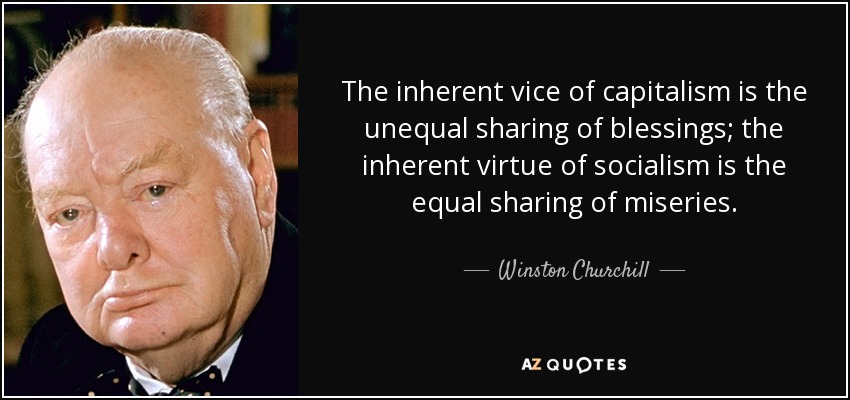
DEFENDING CAPITALISM
It’s been called the greatest engine of material prosperity in human history. It’s lifted people out of poverty, raised living standards, funded research to cure diseases, given us better nutrition, driven mind-blowing innovations, revolutionised the way we live and work and provided us with access to goods from around the world.
Capitalism has done all these things and more, which is why I believe it’s a force for good. Capitalism has made the world a better place by alleviating human suffering. Today, we enjoy lives that are longer, healthier, and better. This is largely because of advances in science, medicine, agriculture, and technology. These advances have been driven by the foundation stone of a capitalist economy – private enterprise.
Central to a global capitalist system is international trade and this, according to the capitalist peace theory, offers a path to world peace. Free trade is built on voluntary interactions of buying and selling and this encourages nations to live in harmony. Free trade raises the cost of war by making nations more economically interdependent. The more that people rely on trade with others, the greater the cost to all parties of a conflict.
The essence of capitalism is economic freedom. Individuals and businesses are free, within the bounds of the law, to engage in commerce at their will and peril. The father of modern economics, Adam Smith, asserted that economic behaviour is driven by self-interest. The Global Financial Crisis (GFC) painfully revealed that the pursuit of self-interest does not always lead to outcomes that benefit society overall.
So yes, capitalism is not perfect, but that’s because human behaviour is not perfect. Economic theory is premised on the assumption that humans make rational choices. However, the GFC showed that we don’t always weigh facts objectively when making financial decisions. As to the ill-conceived subprime lending programs, borrowers, bankers, and brokers were united in the delusional belief that house prices never go south.
Another criticism of capitalism is that it leads to inequalities of wealth and income. Again, this is absolutely true and it’s an undeniable fact that the rich are getting richer. But the poor are not poor because the rich are rich – the two conditions are generally unrelated. The rich did not steal their wealth from the poor. While some do inherit their fortune, most people work very hard to make their money – it has little to do with luck.
No two people are exactly the same – and I say that as an identical twin! You have only to look around you to see that we are not equal in height, weight, looks, intelligence, or on a multitude of other dimensions. Everyone has a unique set of abilities which helps them achieve success. As pointed out by one writer:
Our inherent human inequality should not lead you to despair. On the contrary, imagine how dull life would be if things were otherwise. The fact that I am not equal to LeBron James is a good thing, and so is the fact that LeBron James is not equal to Albert Einstein and that Albert Einstein is not equal to Katharine Hepburn, inequalities are diversity, and diversity is the spice of life.
People will never be wholly equal. Still, those who advocate economic equality would view LeBron James’ basketball superiority as unfair. They would call for James to be handicapped in some way, perhaps by forcing him to give less skilled opponents credit for some of the baskets he scores. Of course, this would do nothing to improve the performance of his opponents nor provide them with any incentive to lift their game.
That’s why taxing the rich more is not the solution to inequality. Around the world, higher income workers already pay the overwhelming majority of taxes. In the words of Abraham Lincoln, “You can’t make the poor rich by making the rich poorer”. To paraphrase Warren Buffett, we all live far better lives because of Henry Ford, Steve Jobs, Bill Gates, and the founders of Google. These brave entrepreneurs helped expand the global economy and this assists the poor as much as the rich.
An open-market, capitalist economy is not designed to deliver equal economic status for everyone. People receive varying financial rewards for the jobs they do and the contribution they make to society. While excessive greed benefits no one, trying to make all of us financially equal is a recipe for disaster. Capitalism rewards productive achievement and provides the necessary incentive for entrepreneurs to take risks and innovate and this benefits society overall.
Even if we somehow managed to redistribute wealth so that every adult in Australia had exactly the same amount of money, it would be fleeting. The smart, the strong, and the devious would quickly acquire the wealth of the slow, the weak, and the gullible. Moreover, people would use their money in different ways. The prudent would save and invest their money while the irresponsible would squander it.
Given our differing attitudes to money, the equal distribution of wealth is clearly an unattainable goal. Even so, I believe that the widening gulf between workers and executives has become excessive. I find it hard to accept that any one individual is worth an annual salary of, say, $10 million. Equally, I don’t believe that sports stars and Rock ‘n’ Roll artists are worth the millions that they are paid.
Nonetheless, I accept that in a free-market economy based on supply and demand, captains of industry, the sporting elite and entertainment celebrities can command multi-million-dollar incomes. While excessive greed benefits no one, trying to make us financially equal is a recipe for disaster. As Winston Churchill observed:
The inherent vice of capitalism is the unequal sharing of blessings; the inherent virtue of socialism is the equal sharing of miseries.
The world has seen a number of socio-economic systems including slavery, feudalism, socialism, communism, and capitalism. For all of its imperfections, it’s my contention that capitalism, like democracy, is better than the alternatives. This is certainly the view of economist, Ha-Joon Chang, who is a reader in economics at the University of Cambridge and the author of 15 books.
In his international bestseller, 23 Things They Don’t Tell You About Capitalism, Chang identifies some of the pitfalls of capitalism. In highlighting these shortcomings, Chang is careful to point out that his book is not an anti-capitalist manifesto. “Despite its problems and limitations, I believe that capitalism is still the best economic system that humanity has invented”, he underscores.
Notwithstanding his tough assault on capitalism, Chang acknowledges that there’s no real alternative to free-market capitalism describing it as “the worst economic system except for all the others”. He says that “being critical of free-market ideology is not the same as being against capitalism”. Rather, his aim is to tell “some essential truths about capitalism”.
I am the first to acknowledge that capitalism has failed to cover itself in glory over the past couple of decades and that public opinion has turned against it. Capitalism is not without its faults because economics is an imperfect social science. Still, humanity as a whole (as I outlined in my previous post) is doing better than it ever has thanks to capitalism. While we still have problems to solve, they are less severe than at any time in history.
As for those nations suffering severe poverty, they must be helped and encouraged to adopt capitalism. The uneven distribution of wealth in the world is due to the uneven distribution of capitalism. Swedish writer, Johan Norberg, makes this very point in his book, In Defense of Global Capitalism, wherein he states:
The poor countries that have liberalized their economies have shown impressive results, while those that have not are stuck in deep misery. Therefore, we need more capitalism and globalisation if we want a better world, not less.
Capitalism offers a practical way to nourish the hungry. Handouts are not the solution to poverty in places like Africa. As Bill Clinton explained: “No country can work itself out of poverty with aid alone”. Training and assistance must be provided to Africa’s private sector to help them drive economic growth and make Africa self-sufficient. Capitalism can do this and more.
Capitalism has changed the world for the better.
Regards
Paul J. Thomas
Chief Executive Officer
Ductus Consulting


1. The free market and capitalism go hand-in-hand but they are not identical. Capitalism refers to the creation of wealth and the ownership of capital production and distribution whereas as a free market system has to do with the exchange of wealth or goods and services.
2. Idiom: “Give someone enough rope to hang themselves” – to allow someone to accomplish their own downfall. Capitalism can do this in a big way, however, it always recovers.
3. Why does it recover? Because we are motivated to make money and buy investments. These are qualities lacking in both communism and socialism.
4. Thanks PAUL this was a very objective blog and pointed out the good and the bad sides of Capitalism.
Hello Paul,
With extensive public sentiment concentrating on the negative side of Capitalism, I found that your Blog provided a much-needed counterbalance.
People seem to forget that most western nations already have very mixed economies. In particular, the UK, Benelux nations, Germany and Scandinavia. Socialism is very much part of their socio-economic system.
Thank you for that great quote from the master of English history, Winston Churchill. His insights are always profound.
As usual, I enjoyed the learnings, including: Capital Peace Theory, Chang’s work and realising that we just need to accept and manage our current imperfect social science system, as it is definitely the best of a very flawed lot!
Many Thanks,
Des